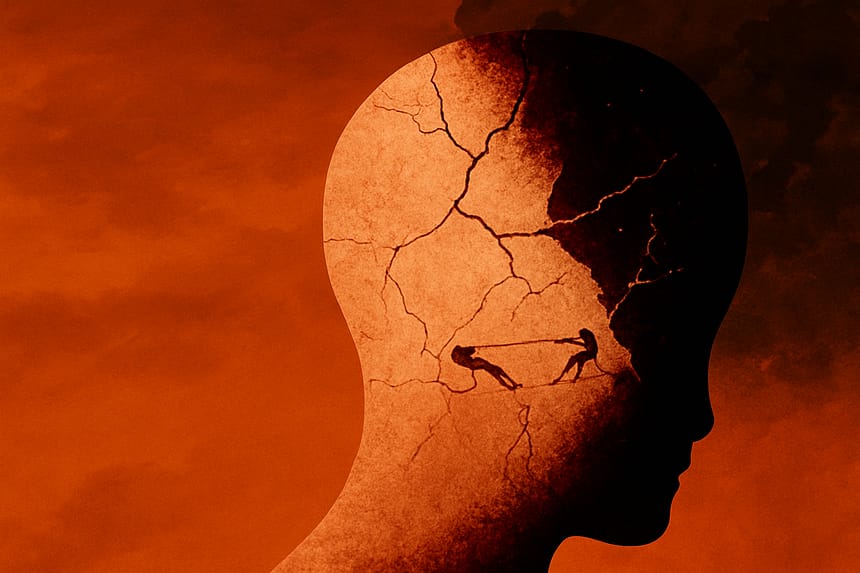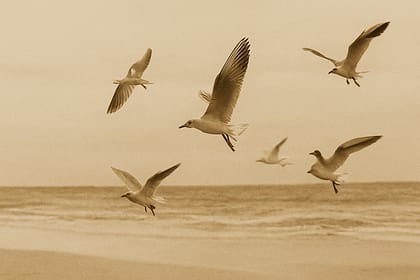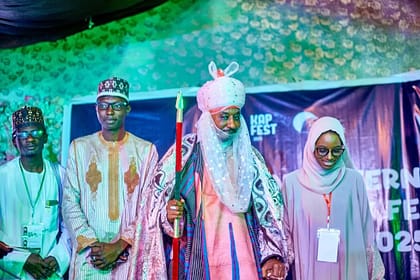Across many African traditions, the mind is not the sovereign it imagines itself to be. The Yoruba show the delineation of this in the inner head (the òrì), while the heart (ọkàn), and spirit (ẹ̀mí) share responsibility and balance. There are examples from several other traditions. We learn early, therefore, that thought alone does not govern life; it must answer to character, community, and the sacred. In this wise, in many Nigerian homes, we are taught that thought works best when it sits with character, kin, and care.
As with several African and Nigerian societies, among my people, the Tiv, evening gatherings by firelight and moonlight have long trained the heart and mind through story, song, and play. From such gatherings grew kwagh-hir, a lively form of theatre with puppets, masks, music, and narration, used to entertain, teach, and help a community think together about life as it is. This cultural doorway becomes an apt lens for approaching Ayo Deforge’s poetry collection, The Mind is Not an Ally. The text itself recognises that “the Mind is a battleground… the soul stands in the crossfire,” where opposing currents contend and judgement needs steadying.
The Mind occupies a central place in Tiv thought and everyday speech. Shíma/Ishima names the heart-mind, the seat of feeling and intention. It is the base form for several names and actions, like Dooshima (‘love’, ‘good/beautiful heart’), Vershima (be focused), and Tavershima (often glossed as ‘steadfast/strong-minded’, ‘determination’), showing how character is imagined as formed from within. In short, as seen within this cosmology, much revolves around the mind and heart together. In essence, as one notes in these names that go beyond niceties, a great deal depends on how we keep (i)shima; what we admit, what we resist, and what we allow to lead. The Mind is Not an Ally is best read within this spirit.
Ayo’s collection is not “poetry” in the flowery, ornamental sense. Rather, it reads as meditations in verse, set in short stanzas, clear lines meant to keep the mind awake to several questions at once. They invite a steady reading rather than applause. They ask you to sit with an idea, return to it, and test it against your day. As she notes in the introduction, “it is a cartography of the Mind’s landscapes,” clear stanzas meant to steady reflection. The book is also deeply personal, encouraging us to see how out of even our deepest despair, something beautiful can grow. Deforge recounts going into the hospital twenty-seven weeks pregnant, and “leaving with empty hands and an emptier heart.” Thus, born from a season when grief made her Mind an adversary, these pages were forged through prayer, guidance, and therapy to reclaim clarity and peace. They record a struggle between despair and hope, offered so others, like us as readers, might learn to keep their own shima with patience.
A note on form as used in this work may help at this point. Throughout, Mind is capitalised as though it were a person with whom one must negotiate terms. Most other words are kept in lower case. This visual choice keeps the central question in view: how shall we live with a mind that is sometimes ally, sometimes adversary, but always present? The book itself names the journey in five parts; the untamed Mind; the emotional Mind; the conflicted Mind; the haunted Mind; the disciplined Mind, moving from diagnosis to stewardship.
This already shows the spirit of the title, The Mind is Not an Ally, which one can decipher as not a declaration of enmity, but more of a caution. Across these pages the Mind, left to itself, is shown to be unreliable: “like a feral beast, the Mind, left untrained, thrashes wildly”; it “speaks in a chorus of tongues… one voice dreams, another doubts”; it “wanders like a vagabon” and, if indulged, “offer it a step, and it will climb the throne”. The title simply names this tendency and prepares the reader for a book about training and keeping company with the Mind wisely.
The early pages set the diagnosis, showing how confusing an untrained Mind can be. It “speaks in a chorus of tongues… one voice dreams, another doubts,” so that inner life feels crowded and contradictory. The words describe what many would recognise, so that a reader can name it and begin to work with it. This architecture is reflective of the African moral thought that acknowledges naming a condition, tracing its consequences, contending with its shadows, and cultivating discipline. It echoes Chinua Achebe’s famous rendering of the Igbo proverb that “A man who does not know where the rain began to beat him cannot say where he dried his body.”
Memory is handled with similar restraint. “The Mind reshapes memory, like an editor at work… rewriting events to fit its narrative,” blending reality with invention until a tidy story appears. When wounded, perception tilts: “everything takes on an ominous hue… it gazes upward for descending dangers… glances downward at perils at its heels,” and sleep grows thin. Such lines resonate with readers familiar with anxiety, grief, or trauma, confirming the book’s reach beyond the personal into the universal.
Tiv thought keeps a useful caution in view: a person lives within more than one current. Our elders warn that troubling forces, visible and invisible, can unsettle judgment. Whatever one makes of such things, the lesson is practical: guard the inner compound; do not enthrone passing moods or hidden pressures.
Another lesson is proportion. The Tiv name the Sky as Aôndo, the far Creator, and this sense of scale helps place our thinking: we are not the whole story, and the mind is not the master of all things. Thought has its place; it must serve what is true and good, not reign over it. This easily feeds into the spirit of the later movements of this work, which looks more towards stewardship than quick remedy. One notes a clear counsel that “You are not your Mind, and it is not your Master.” Therefore, “guard your Mind jealously…” Such counsel, repeated throughout, gives the book both its gravity and its guidance.
You will also hear an explicitly devotional register in places: “don’t just be mindful, be Spirit-led.” Some readers will welcome that horizon; others will bracket it. Either way, it clarifies the direction of travel and can sit alongside the broader, shared wisdom here about attention, proportion, and habit.
How, then, might one read this collection? The best approach is to do it slowly and deliberately. Even in places where you think you know or do not readily appreciate for one reason or another. Note what resists you and return to it later. You will find that certain phrases work like proverbs: plain at first glance, yet opening further when carried into the day. As with kwagh-hir, the aim is not to display but understanding, how to live better with a mind that can help or hinder, depending on how it is trained.
If these meditations in a stanza then help you notice what your mind is doing, and practise steadiness amid noise, then they would have done their work. And if it does something in addition, so much the better.
In all, The Mind is Not an Ally is a thoughtful, resonant collection that balances cultural wisdom, personal grief, and spiritual insight to offer readers both companionship and counsel on the restless journey of the mind.








